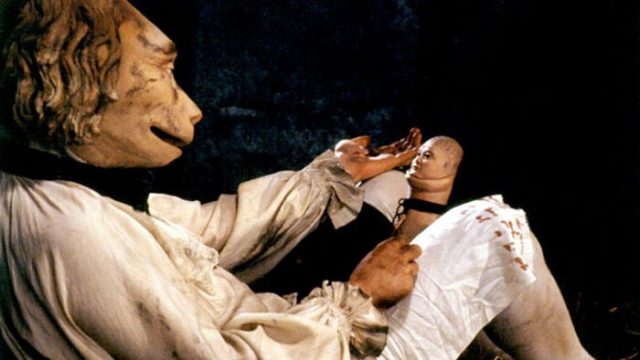There have been quite a few films based on either the works or life of Donatien Alphonse François, better known as the Marquis de Sade, but only Henri Xhonneux and Roland Topor’s Marquis features a talking penis as one of the main characters. His name is Colin. He’s quite tall and anatomically correct except for the fact that he has a face. He’s attached to the Marquis, with whom he often argues because they usually want different things. These aren’t quite the same as the philosophical debates between de Sade and an asylum inmate pretending to be Jean-Paul Marat in Peter Brooks’ Marat/Sade. “Does my mind rule you or do you rule it?” “A thorny question,” Colin replies. It’s implied that without Colin, the Marquis would be a good doggie.
Yes, the Marquis is a dog. Literally, because all of the characters in this ribald comedy set in 18th-century Paris are played by actors in animal costumes. Justine, a hapless prisoner, is a cow. Juliette, a revolutionary, is a horse. The prison guard Ambert is a rat, while the warden Preaubois is a rooster. The scheming Abbé Pompero is a camel. The animals seem chosen more for how they look or for a joke or two rather than for any metaphoric reasons a la Animal Farm; the exception is Pigonou, a former police officer, who is a pig. It’s this clash between the aesthetics of a kids’ movie and strictly adults-only material that gives Marquis its appeal and cult following. Previously, Roland Topor co-wrote and designed Fantastic Planet, an animated film and political allegory that’s also a cult favorite.
There aren’t many movies that look quite like Marquis. Released in 1989, the 200th anniversary of the storming of the Bastille, it builds on Xhonneux and Topor’s earlier TV series Telechat, a news program with cat and ostrich puppets as anchors. Marquis features anthropomorphic animals on realistic sets acting out a story about sex, power, and politics. The immobility of the rubber masks makes everyone fairly inexpressive — only the eyes and the mouths of the animals seem to move, most likely for budgetary reasons. But this seeming limitation actually adds to the effect.
I suspect the first time people watch Marquis, it’s to see what outrages the filmmakers have come up with, and there are plenty. Claymation sequences depict the Marquis’ stories of sex and violence. There’s an orgy at a brothel where everyone wears sex-organ masks. (It’s interesting to think of the actors wearing masks on top of their masks and then pretending to have sex.) Giving in to Colin’s demands, the Marquis appeases him by humping a crack in his cell wall while the wall opens its eyes to see what is going on. Juliette acts as a dominatrix to Preaubois, grabbing and squeezing his wattles as if they were testicles, which he loves like a good submissive. Ambert rapes Justine by milking her, pulling so hard on her teats that they squirt blood in addition to milk. Ambert is homosexual and fixated on the Marquis, who at one point sodomizes him with a lobster rather than have sex with him. (The lobster isn’t one of the characters but dinner.) In a movie filled with deviant behavior, Ambert is one of the more problematic elements of the film. The viewer is supposed to find him and his desire for the Marquis repulsive and comic. The fact that he redeems himself towards the end and becomes one of the more sympathetic characters doesn’t change the fact that he starts out as a homophobic cliché.
Unlike Peter Jackson’s Meet the Feebles, which came out the same year, there’s more to Marquis than just a series of escalating gross-outs. While it doesn’t engage with de Sade’s philosophy the same way as Marat/Sade, Quills, or Salò (speaking of escalating gross-outs), the script is impressively structured. Watching the film now, I’m less interested in its subversive material than I am in seeing how the large group of characters interact. Everyone is hatching schemes either to seize power or win some freedom. It’s interesting that the movie’s two main plots revolve around female characters, one with power and one without, while the Marquis himself is actually rather passive. Justine is in the Bastille to cover up that she is pregnant with the king’s bastard child, the result of a rape. Abbé Pompero and the warden Preaubois plot to have the Marquis seduce her so that they can claim the child is his. Meanwhile, Juliette acts as dominatrix to Preaubois to get information about the prison so she can free Lupino, a political prisoner and revolutionary. Pompero steals the Marquis’ writings from his cell so he can publish them under a pseudonym while Ambert steals them to give to Justine as a love offering because he thinks it is his child she is carrying.
All these plot lines should give you the idea that Marquis is better than it needs to be, though I can’t make any grand claims for it except that it’s consistently entertaining. For a film that seems to exist just for shock value and dirty jokes, it treats its audience with respect. It assumes that they’ll want to see how these animals act in addition to how they fuck.


